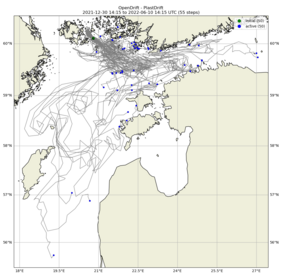The starting point of this case study was an ashtray filled with cigarette butts that accidentally fell overboard from a ferry that was travelling from Stockholm to Turku. The butts landed in the Archipelago Sea, which has the largest archipelago in the world. The sea currents scattered the butts around and many of them landed on the shores of the small rocks and skerries. However, some of the butts had put on their "travelling pants" and drifted for hundreds of kilometers in the course of the five-month period, as their journey was simulated. Some had drifted to east towards the end of the Gulf of Finland and the Russian territorial waters, whereas others had headed towards southern part of the Baltic Sea. The one that had gotten the furthest away, had traveled past the island of Gotland and was only about 100 km west from the coast of Lithuania or about 100 km north from the Southern Baltic Sea Coastline. That location, around 19.3 degrees E and 55.7 degrees N, was close to 500 km away from the starting point in the Archipelago Sea, 20.8 degrees E and 60.1 degrees N.
Most of the 50 cigarette butts had not got that far, they had washed up on the shores or were heading towards the Estonian coast. But how many of these floating butts would had ended up in the bellies of fish and seabirds, that our simulation does not tell. The cigarette butts do not digest easily, so smoking can contribute to other deaths as well, it won't take only those to an early grave, who are actively and passively exposed to smoking. Swallowing cigarette butts can be a death sentence for an animal. Smoked fish is a delicacy in many corners of the world, but we should make sure that the fish that ends up on our plate was not smoked in the sea already...

